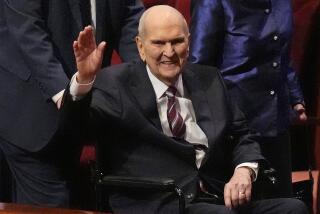Southern Baptist Leader Reelected in Gain for Right
- Share via
DALLAS — Southern Baptists reelected fundamentalist pastor Charles Stanley as their president Tuesday, increasing ultra-conservative strength in the largest U.S. Protestant denomination and bringing it closer to ideological ties with the religious right.
So-called “moderate” Southern Baptists failed in their most organized effort thus far to halt what they call the fundamentalists’ six-year campaign to take over the denomination’s seminaries and institutions.
A record 45,049 church “messengers,” or elected delegates, registered by the time of the election on the first day of the three-day meeting at the Dallas Convention Center. The delegate total doubled the previous high at the 1978 convention and tripled last year’s attendance.
Stanley, a 52-year-old Atlanta pastor who is one of the few Southern Baptist ministers with a national television audience, received 24,453 votes to 19,795 for the moderate candidate, the Rev. W. Winfred Moore, 65, of Amarillo, Tex., president of Texas Baptists.
Stanley’s winning 55.3% of the vote bettered the 52% he received last year when he was first elected. Later Tuesday, Moore was elected first vice president.
Fundamentalist strategists said that through the appointive powers held by the denomination’s president they could attain a majority on the boards of trustees at seminaries and agencies in the Southern Baptist Convention by the end of the decade.
The shift could occur in two years at Southwestern Theological Seminary in Fort Worth, Tex., the largest Southern Baptist seminary, said Russell Dilday, its beleaguered president.
Power Called Real Goal
Dilday and other moderates contend that while the fundamentalists are claiming that they want to rid the church of teachers and administrators who tolerate “liberal” beliefs, virtually all church members are biblical conservatives. Dilday says that the real goal of the fundamentalists is to attain power.
The fundamentalists have accused some seminary presidents of harboring liberals on their faculties or allowing liberal interpretation of the Bible.
The election’s broader significance is the growing association of Southern Baptist fundamentalist leaders with the religious right, which so far has been mostly a movement of independent conservative Protestants, such as Moral Majority leader Jerry Falwell.
Joined Lobbying Group
Stanley and three of his immediate predecessors in the Southern Baptist presidency last year joined the boards of the American Coalition for Traditional Values, a lobbying group in Washington directed by religious right leader Tim LaHaye.
Pastor William Self of Atlanta told a pre-convention forum of 5,000 cheering moderate ministers and lay persons that certain “political groups want access to the resources of our convention.”
Moderates, using Stanley’s Atlanta church as an example, have charged that fundamentalists in the denomination tend to contribute less to Southern Baptist causes and more to outside, conservative missions.
School Prayer, Abortion
The religious right could also gain more influence if the 14.3-million-member denomination backs its efforts on school prayer and abortion issues. The Southern Baptists, once rigid church-state separationists, adopted a resolution supporting prayer in public schools in 1982 and only slightly modified it at a later convention.
Stanley, in a talk before the election and in remarks after, emphasized that he will work toward reconciliation and healing wounds from the convention fight. But he reiterated an oft-stated position that “there are limitations to academic freedom” for professors at Southern Baptist institutions. Stanley and the four previous denomination presidents have carried the banner of “inerrancy” (historical reliability) of the Bible.
Moderate organizers were dismayed earlier when a telegram indicating that the Rev. Billy Graham was supporting Stanley was released Monday night to selected reporters. The telegram was signed by Graham assistant T. W. Wilson. It suggested that the evangelist, vacationing in Europe, had told Wilson that if he were able to attend he would vote for Stanley.
Graham, a Southern Baptist, previously had said that he was avoiding the annual meeting because of the polarized conflict. Neither Graham nor Wilson could be reached to confirm whether the telegram was authentic.
More to Read
Sign up for Essential California
The most important California stories and recommendations in your inbox every morning.
You may occasionally receive promotional content from the Los Angeles Times.













